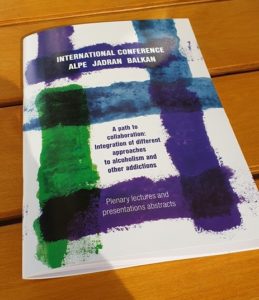 Baburin A.N.[1,2], Kopeyko G.I.[1], Borisova O.A.[1], Kazmina E.A. [1], Magay A. I.[1,2]
Baburin A.N.[1,2], Kopeyko G.I.[1], Borisova O.A.[1], Kazmina E.A. [1], Magay A. I.[1,2]
[1] MHRC, Moscow, Russia
[2] Interregional social movement supporting Family Sobriety Clubs, Moscow, Russia
For correspondence: e-mail: Andrey.magay@ncpz.ru
Tel +7(926) 357-70-24
At the present stage of the development of science, the “gold standard” in assessing the problems of dependent behavior is the biopsychosocial spiritual model. According to the widespread approach, in addition to biomedical care, a patient with a narcological disease should be provided with psychological support and social support. An important component is also the satisfaction of spiritual needs, taking into account the religious worldview of the individual.
Since 1992, Russia has been implementing a multidisciplinary outpatient care program for alcohol-addicted comorbid patients based on family sobriety clubs according to the method of Vladimir Hudolin (Vl. Hudolin, 1994) in the context of church parishes of the Russian Orthodox Church (A. Baburin, 2008). The basic provisions of the program are multidisciplinary (a team of specialists is involved — a psychiatrist, narcologist, clinical psychologist, sociotherapist, priest); the use of a psychotherapeutic environment based on the methods of the therapeutic community (TCs); use of the therapeutic resource of the religious Orthodox community, updating the family type of communication and establishing social support for family members in the current social network; connecting a wide range of social rehabilitation activities (pilgrimages, sports and creative events, festivals and camps) to group work (Magay A.I. et al. 2017).
In 2016-2018, a scientific study was conducted on the basis of the MHRC, in which 26 patients with established diagnoses of paranoid schizophrenia, schizoaffective psychosis, low-grade schizophrenia, endogenous depression, in which comorbid alcohol dependence was observed, took part. Three clinical types were identified and described, depending on the rate of increase of mental and alcoholic disorders, modification of the clinical picture, as well as treatment characteristics. All patients had a religious worldview and participated in a spiritually-oriented outpatient care program.
As a result of the study, a technology of confessional-oriented rehabilitation of patients with endogenous mental diseases with alcohol dependence was developed, which included therapeutic and rehabilitation modules (Kopeyko G.I., 2019). High efficiency of rehabilitation with a multidisciplinary approach was achieved as a result of a combination of psychopharmacotherapeutic treatment and various types of psychosocial and spiritual support with the updating of religious coping strategies, relying on basic spiritual values, and inclusion of all family members in the rehabilitation process. The work used the dialogical approach of M. Bakhtin in the tradition of a spiritually-oriented dialogue T.A. Florenskaya.
Thus, the combined use of biological therapy, psychosociotherapeutic procedures, as well as a change in the personality’s value attitudes with the reorientation of the personality to spiritual meanings within the framework of a spiritually oriented approach, influence the formation of a high quality of remission in comorbid patients with alcohol dependence.




